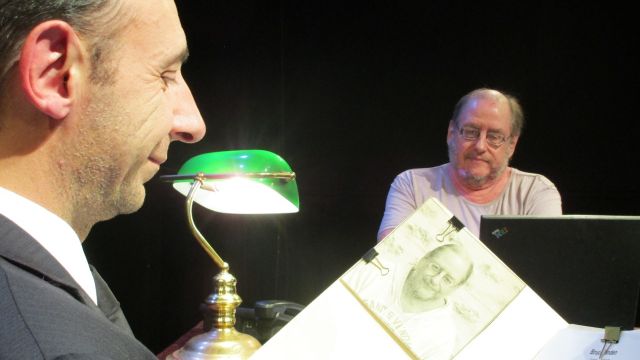Noble Cause & Boiled Cabbage
Local playwright and impresario Tony Moore here presents two short pieces, one a drama, the other a comedy, as a double feature.
The first play, Noble Cause, revolves around a left-leaning professor of history (Brian Godfrey), being interviewed by a suave-but-sinister government agent (Stephane Avril), who suspects the academic’s latest book may be sympathetic to the cause of Islamic fundamentalism. Their dialogue contains much spirited debate about the conflict between civil liberties and national security, the importance of free speech, the sometimes contradictory imperatives of political correctness and the ties that bind academia to government. It’s to Moore’s credit that his script touches upon so many hot-button issues without ever becoming overtly preachy, the dialogue has a naturalistic flow and at times a snappy wit.
However, this is not a dialogue between equals and it would benefit from more balance. Moore might not believe that the opposing positions of both characters have equal merit, but it would be a more compelling play if both of the characters could argue their point with the same degree of eloquence and charisma. Too often, The Agent is allowed to overwhelm The Professor, whose counter-arguments come across as flustered and weak in the face of elegantly persuasive rhetoric. The casting adds to the impression that Moore is stacking the deck here… Avril is charismatic, well-groomed and charming… Godfrey comes across as dishevelled and at times oddly inarticulate for someone in such a lofty academic position. Still, they have a bizarre “odd couple” chemistry that intrigues.
 The second piece, Boiled Cabbage, is an absurdist comedy which examines the way in which a working class English family (Shannon Gray, Jabez Retallick, Joanna Webb and Godfrey again) adjusts to the extensive social changes wrought by World War II. Their changing attitudes are used as a metaphor for the changes to English society in general that were the enduring legacy of this bloody conflict. The characters often talk as if they are observers in their own life, rather than direct participants in it and they speak with an erudite vocabulary – yet, the accents are unrefined and the tone of delivery is disarmingly intimate. The contrast between what the actors are saying, and the manner in which they say it, is where much of the humour emerges. The performers valiantly inject some humanity into this inherently artificial construct, but this kind of self-aware comedy writing is still likely to be an acquired taste. There are moments of both character development and social commentary that come across as rushed, and generally the play would’ve benefited from being expanded in length. It is simply too short to do justice to the many thought-provoking themes that Moore is attempting to touch upon.
The second piece, Boiled Cabbage, is an absurdist comedy which examines the way in which a working class English family (Shannon Gray, Jabez Retallick, Joanna Webb and Godfrey again) adjusts to the extensive social changes wrought by World War II. Their changing attitudes are used as a metaphor for the changes to English society in general that were the enduring legacy of this bloody conflict. The characters often talk as if they are observers in their own life, rather than direct participants in it and they speak with an erudite vocabulary – yet, the accents are unrefined and the tone of delivery is disarmingly intimate. The contrast between what the actors are saying, and the manner in which they say it, is where much of the humour emerges. The performers valiantly inject some humanity into this inherently artificial construct, but this kind of self-aware comedy writing is still likely to be an acquired taste. There are moments of both character development and social commentary that come across as rushed, and generally the play would’ve benefited from being expanded in length. It is simply too short to do justice to the many thought-provoking themes that Moore is attempting to touch upon.
Sets n’ props for both plays are minimalist, but sufficiently evocative. The costumes serve as a fitting embodiment of character, and the music selections add to the atmosphere without intruding upon the story. Overall, both short plays have striking moments, but the whole is less than the sum of its (sometimes brilliant) parts, and both works could benefit from further revision. Still, those interested in supporting local artists and experiencing original works may feel it is worth sitting through an uneven night of theatre just to see something new, given how the Adelaide theatre scene has become dominated by revivals and works by American/European writers.
Benjamin Orchard
Subscribe to our E-Newsletter, buy our latest print edition or find a Performing Arts book at Book Nook.

